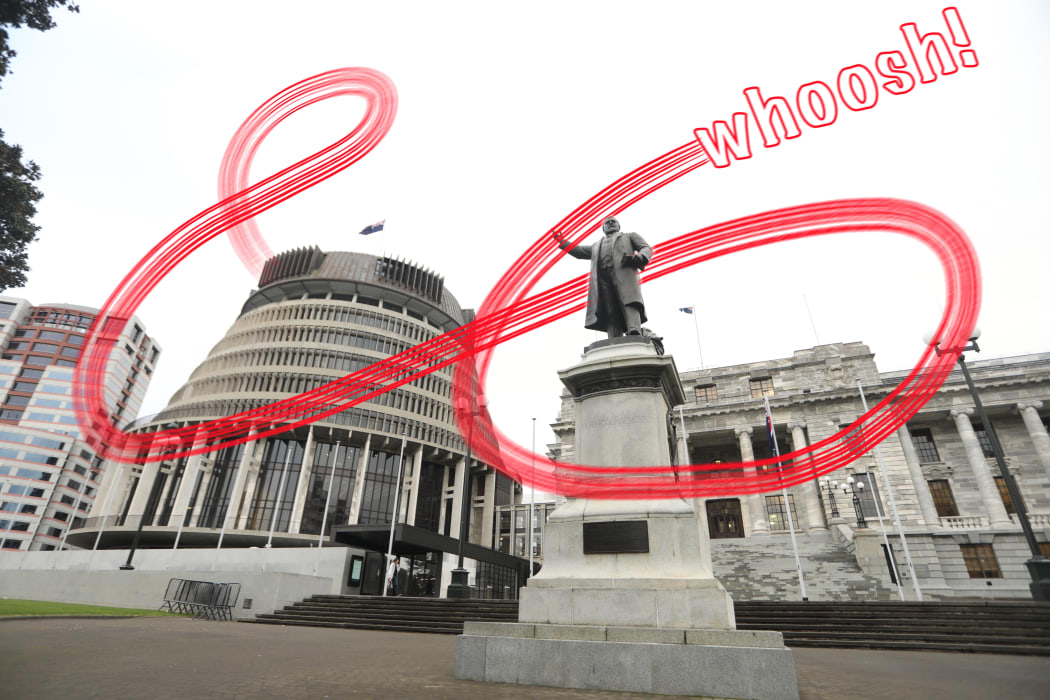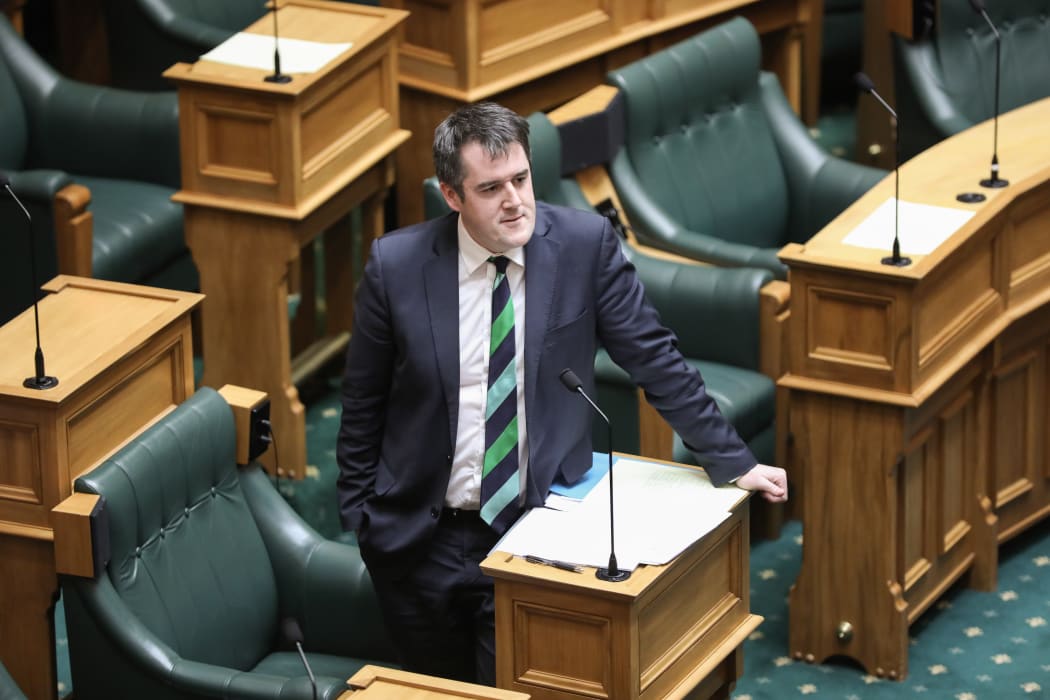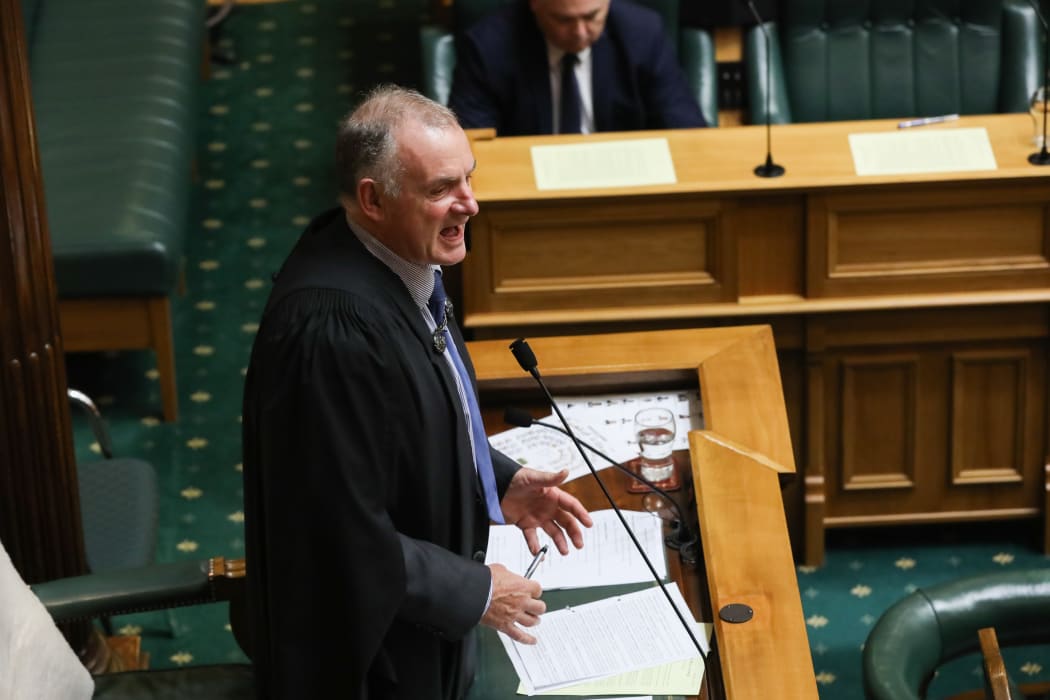The relationship between Government and Parliament can be confusing. Lots of people don’t really differentiate between them.
That’s an understandable confusion - under parliamentary democracy a governing party or coalition also dominates the legislature. Otherwise they can’t govern.
But despite the confusion there is actually a gulf between governments and parliaments - especially between their roles.

Whoosh! A bill speeds on its way. Photo: VNP / Phil Smith
This divide can be seen in committees, but is most obvious in the House when governments decide they need to move quickly, and apply the rules of urgency.
On Tuesday the House went into urgency - particularly to pass two bills related to Covid-19. One on financial support, the other enabling the new traffic light system and employer vaccine mandates. That second one is particularly significant.
Chris Hipkins told the show yesterday that “it is a very technical and complex piece of legislation. Anything that involves the Bill of Rights and anything that involves significant changes around employment law – both of those things can be very complex in and of themselves. In this particular case it involves elements of both.”
As you can imagine the legal drafters that grind policy into legislation in the Parliamentary Counsel Office have probably had quite a few busy weeks trying to get it perfect. But only they and the Government had seen the details until Tuesday when it emerged for debate.
That’s not unusual for urgency; on these kinds of issues, if a government had a finished bill earlier they might just debate it sooner rather than pause and let everyone peruse it.
The reaction to urgency reveals the natural divide between Government and Parliament. Because, while governments want to make good laws and pass them efficiently, parliaments do too, and they are jealous of their own role in that process - of scrutinising and improving each piece of legislation.
National MP Chris Bishop opened his third reading speech on that Bill like this.
“Well, here we are on Wednesday afternoon, and the House is about to pass one of the most far-reaching and significant pieces of legislation that this Parliament will consider, and the House has had precisely 24 hours to look at it—24 hours for the first reading, the second reading, the committee of the whole House stage, and now the third reading. As Dr Dean Knight of Victoria University, that very fine law school, says, it is a constitutional disgrace. The Human Rights Commission has criticised it. The Council for Civil Liberties has criticised the speed with which this bill is being passed, and it reflects an arrogance of the highest order from this Government, that they think they can pass this legislation in just 24 hours without scrutiny. I put it to the Parliament that this is contemptuous of the Parliament. It is contemptuous of the people of New Zealand, and it is contemptuous of the rule of law.”

Chris Bishop in the House (file photo) Photo: ©VNP / Phil Smith
Parliament’s foot soldiers
I can almost hear you from here saying “but oppositions almost always portray urgency as a travesty of democracy”.
Yes, it’s true that all parties in opposition tend to rail against urgency but find when in government that it’s a useful or even necessary tool.
But that reaction isn’t only about being in opposition. Many opposition MPs come to see themselves as the foot-soldiers of Parliament, defending the bulwarks of due process against the invading hordes of government overreach - or something equally stirring.
They are not in that position alone - there is also the Speaker.
Parliament’s champion
Speakers may come from a governing party but they are both Parliament’s servant and its representative. If the role and duty of Parliament has a champion this is it.
On Wednesday, before the third reading kicked off under urgency Trevor Mallard had a ‘word’ with the House.
“During this forthcoming debate, I will allow a much wider and looser approach than is normally the case at the third reading stage of a bill.
“Urgency of this type used to be common. It isn't any more, for good reason; it resulted in bad law.”
“Taking a bill one stage per day and using even a truncated select committee process improves the understanding of legislators, allows for informed public and specialist comment, and, generally, improves the quality of the legislation.”
Trevor Mallard outlined how he thought Parliament could have been better involved in the legislative process.
“This policy first became public on 15 October. The policy decisions, the drafting instructions, or an exposure draft of the bill could and should have been made public and preferably considered by a select committee, either through reference through the House or using committees' inquiry functions. The failure for that to occur is primarily the Government's responsibility.”
But equally he admonished parliament’s own foot soldiers.

Trevor Mallard in action in the House (file photo) Photo: ©VNP / Phil Smith
“But I do note that I have enquired of the Health Committee, the Governance and Administration Committee, and the Finance and Expenditure Committee, and no member of the House requested any use of the inquiry functions at any of those committees, and, therefore, it is a matter which has widespread responsibility.”
In other words, it’s all very well for the opposition to lament and denounce urgency but they had known the policy outline but yet took no initiative in carrying out parliament’s oversight and inquiry role into something that was very likely to be legislated under urgency.
Select committees don’t have to sit and wait for the government to deliver them tasks - they are part of Parliament, not government - and so are their own masters. And they have wide powers and can preemptively launch inquiries into whatever they want.
Backbenchers from across the House might have spent the last few weeks hearing evidence, having briefings, allowing a public view and forming and informing their own views on the best approach to a vaccine-based management system.
Opposition or not, it is the job of every non-executive MP to help Parliament scrutinise the Government.
After a couple of solid days debate both bills had passed under urgency by just before Midnight on Wednesday. 10 solid hours of debate the first of the two bills passed its third reading and can now progress through its checks and signatures to become law. The second bill (the financial support bill), began immediately and managed to get through the hurdles much more quickly than its twin, passing a little before midnight on Wednesday (which for MPs was the end of a very long Tuesday).


